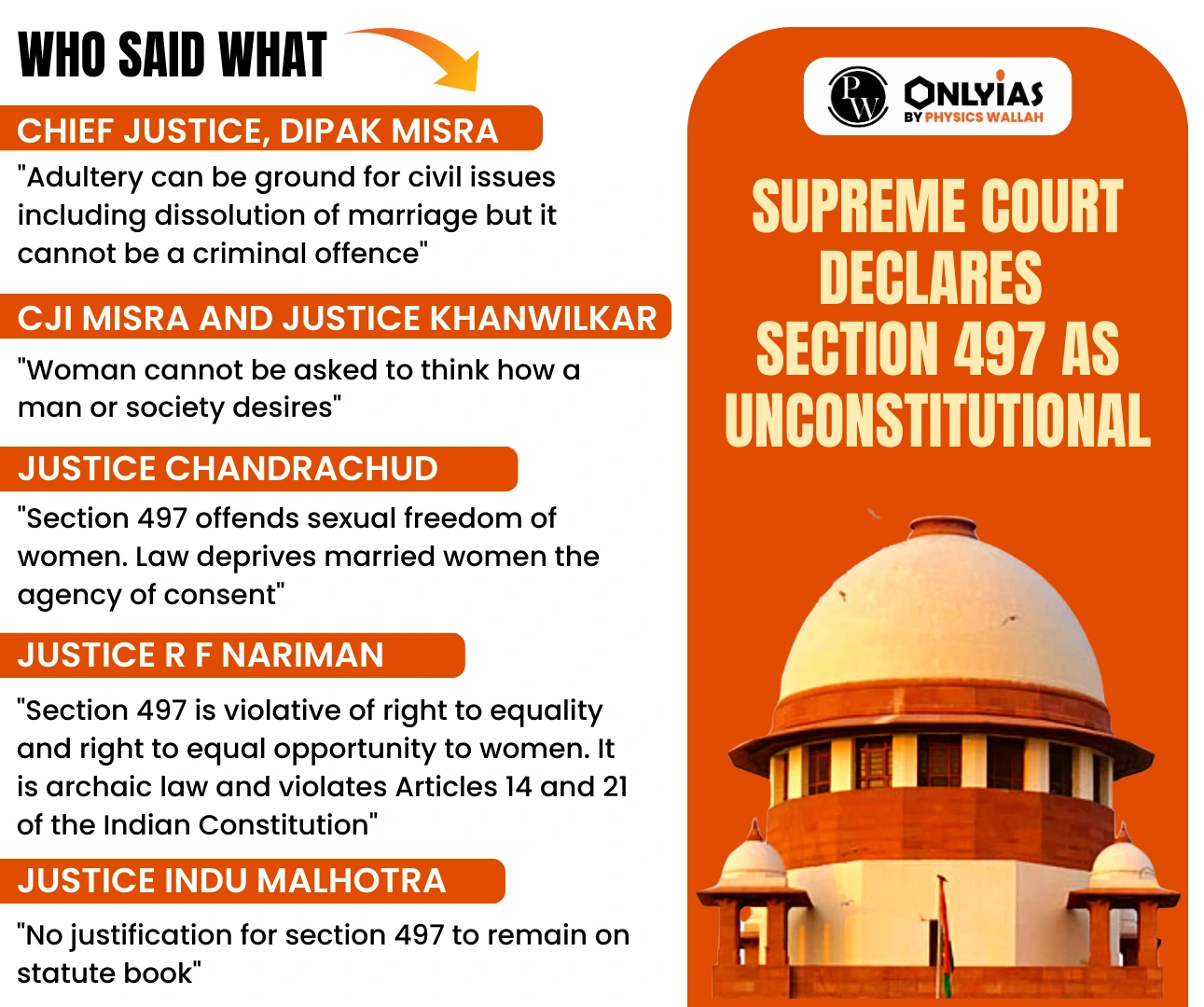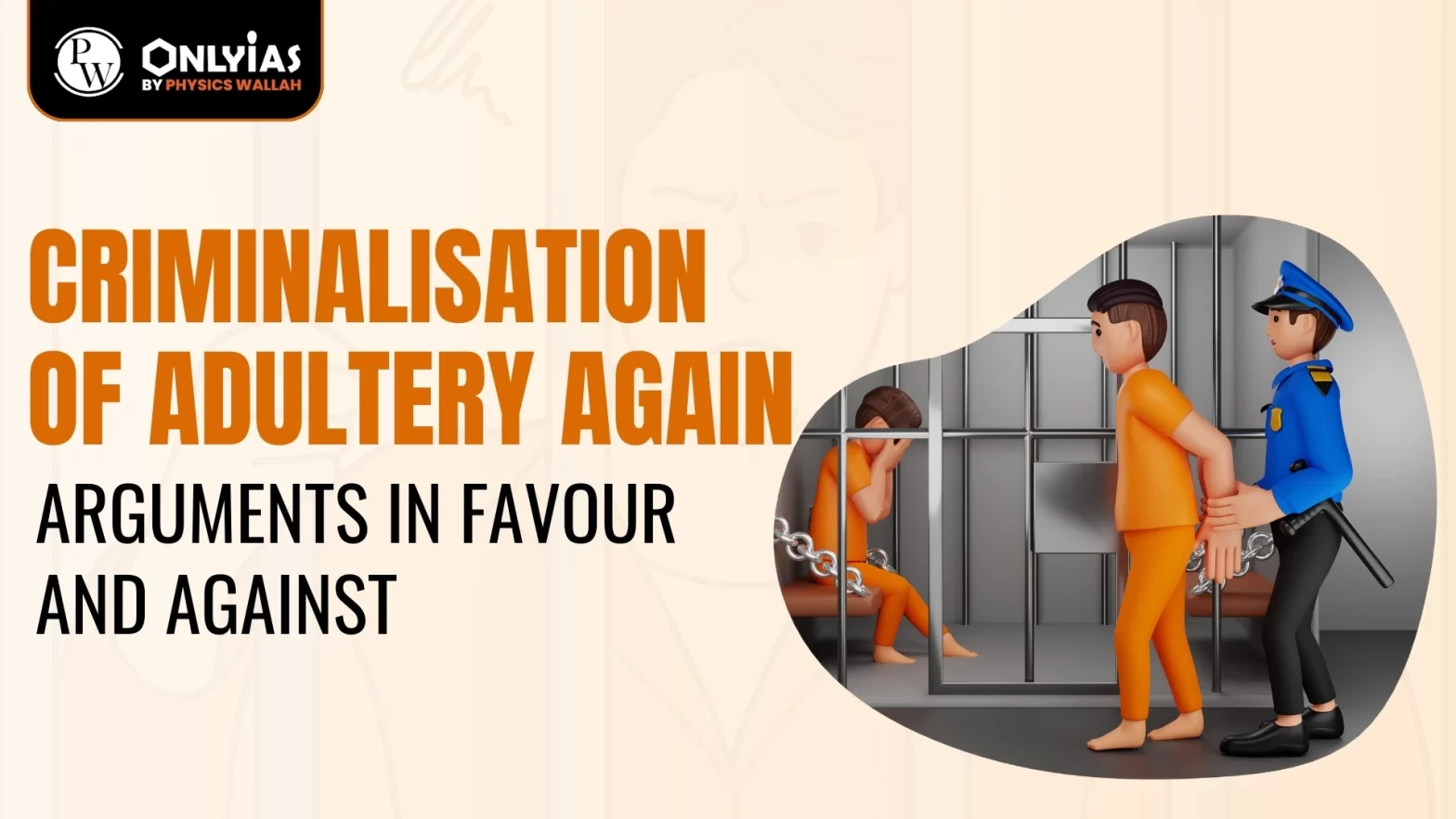Context: This article is based on the news “Re-criminalising adultery as a gender-neutral offence” which was published in the Hindu. The Parliamentary Standing Committee on Home Affairs has suggested that adultery should be re-instituted as a crime in the Bharatiya Nyaya Sanhita (BNS), 2023.
| Relevancy for Prelims: Criminalisation of adultery, Parliamentary Standing Committee on Home Affairs, Section 497, Law Commission of India, Malimath Committee, Fundamental Rights, Indian Penal Code (IPC), and Code of Criminal Procedure (CrPC).
Relevancy for Mains: Arguments in Favour and Against Criminalisation of Adultery Again, Joseph Shine versus Union of India (2018) Case, Issues related to Marriage and marital norms and Gender Equality in India. |
What are Penal’s recommendations regarding the criminalisation of adultery?
- The Committee examined the three new criminal law Bills set to replace the Indian Penal Code (IPC), Code of Criminal Procedure (CrPC), and the Indian Evidence Act recommended the criminalization of adultery but on gender-neutral lines.
- This recommendation comes almost 5 years after a 5 judge Constitution Bench of the Supreme Court unanimously decriminalized adultery in 2018.
Read more about the Parliamentary Committee’s Recommendation on Adultery here.
What is Adultery?
- Adultery: Voluntary sexual intercourse between a married person, man or woman, and someone other than that person’s current partner.
- Section 497: Until 2018, the IPC contained Section 497, which defined adultery as a criminal offense that attracted up to five years in prison, or a fine, or both.
- Discrimination Under Section 497: Only men could be punished under Section 497, not women. It violated Articles 14, 15, and 21 of the Constitution which protects the fundamental rights to equality, non-discrimination, and life respectively.
- Section 497 Declared Unconstitutional: In Joseph Shine vs Union Of India, the Supreme Court unanimously struck down Section 497 of the IPC on grounds that included discrimination.
- The Supreme Court held that the state should not interfere in the private matters (Article 21- Right to Privacy) of consenting adults and that their choices in matters of personal relationships should be protected.

Yusuf Abdul Aziz v. The State of Bombay
- The constitutionality of Section 497 of the IPC was challenged before the Supreme Court in Yusuf Abdul Aziz v. The State of Bombay (1954).
- A constitutional bench held then that Section 497 did not violate the right to equality as enshrined in Articles 14 and 15 of the Constitution.
- Sex is a sound classification and although there can be no discrimination on such account, the Constitution itself provides for special provisions with regard to women and children.
- Thus, Articles 14 and Article 15 read together validate Section 497 of the IPC.
|
What are the arguments in favor of the criminalisation of adultery?
- Ensuring Gender-Neutral Approach: According to the Committee, the revoked Section 497 of the IPC only penalized the married man, and reduced the married woman to be the property of her husband.
- The Malimath Committee (2003) on Reforms of the Criminal Justice System proposed in its report that adultery be retained as an offense but on gender-neutral terms.
- Protecting the Institution of Marriage: Adultery is considered as a threat to the institution of marriage and the stability of families and criminalizing it is seen as a means of protecting families from emotional and psychological trauma.
- The Committee is of the view that the institution of marriage is considered sacred in Indian society and for its protection, section 497 should be retained in the Bharatiya Nyaya Sanhita in gender-neutral form.
- Act as Deterrence: The intention behind the Criminalisation of adultery in the present day is to deter the adulterer from committing such a “crime”.
- Although, the law has failed to prevent the act of adultery, such failure cannot be attributed to the law itself but to its enforcement.
- Ensure Social Harmony: Supporters of criminalization believe that the law could contribute to social harmony and stability by discouraging extramarital affairs. It is argued that strong family units are essential for society’s overall well-being.
- Boost Public Morality: Criminal law everywhere in the world serves as a guardian of the moral principles of society, protecting a society’s historical roots while leading it towards a progressive social order.
- It is believed that the law should reflect and enforce the moral values of the society it governs, and criminalizing adultery is seen as a way to align legal norms with societal morals in India.
What are the arguments against the criminalisation of adultery?
- Violation of Personal Freedom: No marriage or alliance can take away one’s right over one’s own body. The law on adultery was discriminatory on the ground of sex and it is violative of the fundamental right to life and to live with dignity.
- Critics argued that the state should not regulate the personal relationships of consenting adults unless there is a compelling reason, such as harm to others.
- Transformation of Society: Societal attitudes toward marriage and relationships are evolving and the law needs to reflect these changes. Criminalization is seen as a reflection of outdated moral values that do not align with contemporary perspectives on individual autonomy and equality.
- Marriage is no Longer Considered Sacred: Changing social norms, increased individual autonomy, and evolving priorities have shifted perceptions of marriage in India.
- Younger generations prioritize personal choice, career, and happiness, leading to a more diverse and dynamic understanding of relationships, departing from traditional notions of marriage as inherently sacred.
- Adultery as a Civil Wrong: Adultery is considered as a civil wrong, better addressed through family laws and divorce proceedings. Criminalising such personal matters is considered disproportionate and likely to lead to unnecessary legal entanglements.
- According to SC, if it is treated as a crime, there would be an immense intrusion into the extreme privacy of the matrimonial sphere and should be better left as a ground for divorce.
- Focus on Consent and Mutual Agreement: It is suggested that instead of relying on punitive measures, the focus should be on fostering communication, understanding, and consent between partners.
- Impact on Children: The criminalisation of adultery would potentially have negative consequences for children in the affected families. Legal proceedings and the stigma associated with criminal charges could harm the well-being of children, and alternatives like family counseling were proposed as more constructive approaches.
Way Forward for Criminalisation of Adultery,
- Provide Holistic Solution: The problem with adultery being in IPC was two-fold, first is criminalising it based on the institution of marriage and the second is treating women as property.
- Making it gender neutral would do away with the second problem solving the patriarchy problem, but still leave the first problem unresolved.
- Following a Forward-Looking Approach: While ensuring gender neutrality, it is important to specify how it would apply to all relationships that will be recognised as marriage, including heterosexual marriages between trans people as envisaged by the judgment in Supriyo v. Union of India.
- Ensuring Validity of Legislation: Any attempt to re-criminalize adultery would likely face legal challenges based on constitutional principles, including the right to equality and personal freedom.
- The Parliament is well within its scope to overrule judicial rulings, but such legislative action will be considered valid only if the legal basis of the judgment is altered.
- Aligning Public Opinion and Societal Values: It’s important to determine public opinion and assess whether there is widespread support for criminalizing adultery. Societal values and norms significantly shape legal frameworks, and any proposed changes must align with evolving perspectives.
- Exploring Alternative Approaches: Policymakers should explore alternative approaches to address concerns related to the sanctity of marriage, family stability, and moral values. This could involve promoting awareness, education, and support services rather than relying on criminal sanctions.
- Engaging Stakeholders: Engaging with various stakeholders, including legal experts, activists, and representatives of different communities, can help shape a more inclusive and informed decision-making process.
Conclusion:
The debate surrounding the criminalisation of adultery is multifaceted, with arguments both in favor and against reflecting diverse perspectives on societal values and individual freedoms. The Parliamentary Standing Committee’s recommendation to re-criminalize adultery, albeit on gender-neutral grounds, seeks to address concerns related to the institution of marriage, family stability, and moral values.
![]() 4 Dec 2023
4 Dec 2023

